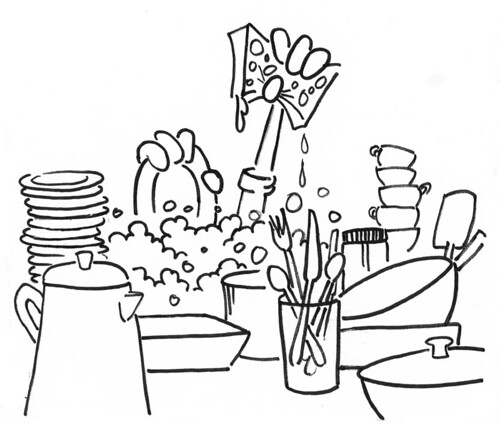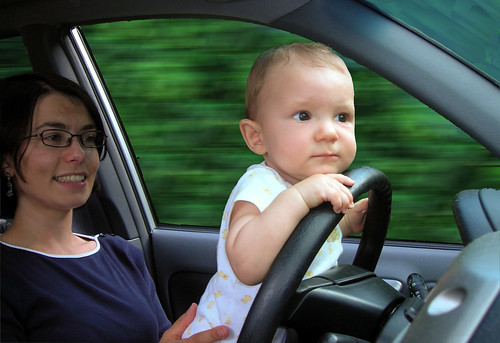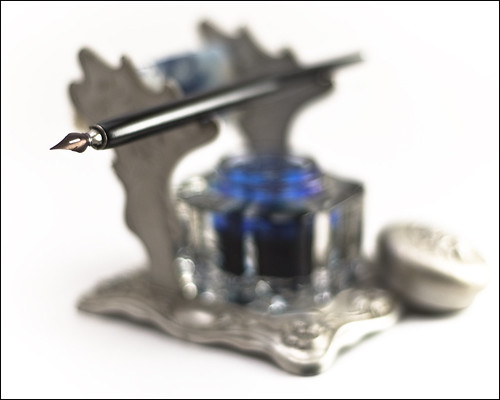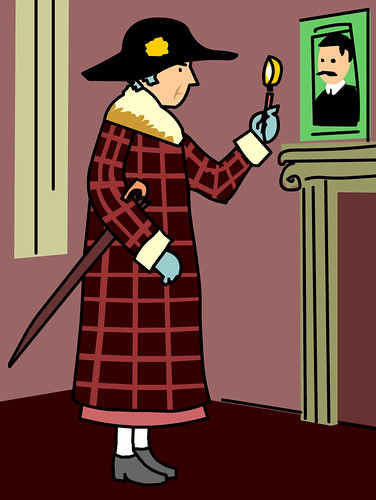For years I have been labouring (quite literally) under a delusion. I thought I was a naturally tidy person, because having mess around stresses me. And since I knew how to do all the tasks required, I couldn’t figure out why the stressful messful state of things continued.
When I was in my early teens, my mother came up with a complex mathematical – er, thingy, which not only ensured that each member of the household had a fair share of the housework, but that each person’s share was largely composed of the work they liked most (or rather, disliked least). Brilliant. Me for cleaning the toilet and cooking the dinner (no, not at the same time); avaunt, ye dreaded dish-washing!
That was some fifteen years ago. I have been an independent alleged-adult for ten years now, and it was only recently I realized that subconsciously I still classify the jobs I really don’t like as “someone else’s problem.”
To be fair, the Caped Gooseberry does a lot of these jobs, such as putting out the rubbish and emptying the compost bin (among other things) – as previously mentioned, my husband is not lazy – but there are nonetheless a good many jobs that aren’t going to happen unless I do them myself.
Those of you considering becoming adults, be warned: pixies do not appear in the night to do the dusting, and dishes do not wash themselves (unless you’re having tea with Merlyn).
There is quite a bit of work which goes into running a household, and the less organized you are, the more work it is. Hence my problem. While I knew how to clean, I didn’t necessarily know how to organize. Where to start?
Eventually I swallowed my pride (and my delusions) and admitted that I could use some help. I was never going to be one of those paragons who vacuums herself out the door when she goes on holiday (so as to have everything pristine when she returns), I just wanted the house to become clean and peaceful, and to stay that way with the minimum of conscious effort from myself.
Enter FlyLady, recommended to me by our previous minister. I borrowed her book from the library, and after various re-readings, browsings of the website – and the passage of a couple of years – I decided to actually try it properly, shiny sink and all.
In order to have some record of the experience, I kept a journal for the month of April, while doing the 31 Beginner BabySteps. These aren’t included in the daily emails, which are mostly advice, encouragement, testimonials and advertising for FlyLady-approved cleaning gear. There are about a dozen a day, although on Day 12 your task is to delete old ones; and on Day 31, to drop down to the FlyLady Lite emails (assuming you feel ready).
The FlyLady system is all about routines: you do the same things over and over again and then you don’t have to think about it, you just do it automatically. This applies to things you do every day, on a particular day of the week, or a particular week of the month. Forming good habits, little by little.
To be honest, I think I needed longer to practice each step of the routine in order to cement it in place, before adding further steps. Some steps I slipped right into – like dressing first thing in the morning – and others are less intuitive and I have to keep reminding myself. Such as, for example, remembering to replace negative self-talk (“I’m lazy! It’s hopeless!”) with positive self-talk (“I can choose what I do, and I can do it!”) – affirmations, the Artist’s Way would call them. Helpfully, all the routines are to be written down as you go, so you have something to refer to.
Looking around, those who seem to have the most success with FlyLady are those who adapt the system to suit their culture and circumstances. No need to wipe your sink dry each time you use it, for example, if your tap water isn’t hard and doesn’t leave marks when it dries.
And then there’s the getting dressed to shoes – an intended morale booster, which allows you to step straight out the door if need be. Here in New Zealand, it is normal to ask, on entering a house, whether it’s a “shoes off” house – and many are, mine included. Wearing shoes around the house so you can go out at a moment’s notice is about as weird as carrying your handbag around the house for the same reason. On the other hand, unless it’s high summer (which it seldom is) I wear socks and slippers, because my feet are almost always cold. So that’s “shoes” for me.
There are other minor cultural allowances I had to make as well. Doing laundry all the way from sort to shelve is only possible when the weather co-operates, as the vast majority of New Zealand laundry is dried on lines outside in the sun. This can be frustrating in winter, but on the other hand, you get that lovely fresh-air scent in your laundry, and you don’t have to worry about dryer fires.
But enough of this, I hear you say. Never mind the cultural adjustments, does it actually work? Well, as with most things, you get out as much as you put in, but I’ve never before come across a system which makes it so easy to get started and keep going. Possibly because it insists that you can’t “get behind” – you just start from where you are.
Twice a day you spend a couple of minutes clearing off a place that collects stuff – you know the one – and actually putting the stuff where it belongs, not just dumping it somewhere else. My first target was the top of the chests of drawers in our bedroom, which were generally invisible under thick strata of books, mending, odd clothes, pieces of paper, random oddments – you get the idea. It loomed at me in the darkness as I lay in bed.
I cleared it off in two or three two-minute attacks, and to my great surprise, it has stayed clear. There is a small stack of books in one corner, closest to the bed, with a candle-lamp and matches for late-night reading. At the other end is a decorative bowlful of knitted hats and gloves, winter having arrived in early autumn this year. And that’s it.
Another daily task is to spend fifteen minutes decluttering in the zone of the week (a monthly rotation). The idea is that you can’t really get a room clean until you’ve got all the junk out of it. To my great surprise, I was dusting the windowsills and the skirting board (the skirting board!!!) in the bedroom within the week. And having palpitations at the amount of dust I found, but that’s another story.
To make the long story short, the overwhelming thing about housework is that there is so much of it. Where do you start? How do you possibly find the time and energy for it all? FlyLady proposes an eminently sane answer: you do it a little at a time. Make a routine (it doesn’t have to be hers, the main thing is to have one and stick to it) and just keep going.
I am still working on developing and editing my routines to make sure they work as well for me as possible, but I am cautiously hopeful. I may never be naturally tidy, but that doesn’t mean a clean and tidy peaceful home is not within my reach!












